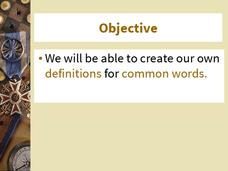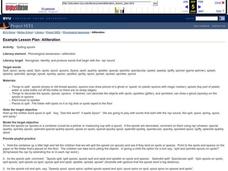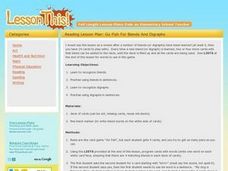Curated OER
Experiencing "Romeo and Juliet"
Ninth graders read and analyze the William Shakespeare play "Romeo and Juliet" and compare it to the 1996 modern version of the play and the movie "West Side Story." They write an essay comparing and contrasting the three versions.
Curated OER
Word Definitions
Enhance your class' writing skills using this resource. It begins with a list of three words that learners have to define in a creative way. Then, they discuss a set of examples of non descriptive writing and make suggestions for how to...
Shakespeare Uncovered
Suits of Woe: Grief and Loss in Hamlet
“Thou know’st ‘tis common; all that lives must die/Passing through nature to eternity.” Grief, and the response to grief and loss, is the focus of a series of activities that uses Hamlet as a launchpad. Groups examine Act I, scene ii to...
Perkins School for the Blind
Let's Pretend
Playing pretend with real objects or concepts is a wonderful way for learners to make object-to-action connections, as well as practice daily living skills. Learners with visual and intellectual disabilities use a wide variety of real...
Curated OER
Create a Playbill!
Seventh graders explore the various elements found in the advertisement of a dramatic experience. Playbills are created that reflect the plot without revealing the climax of the play. Costumes, set construction, and character description...
Curated OER
Past, Present, and Future Tense Verbs
A short and straightforward worksheet is the perfect addition to your grammar unit on verb tense. Twelve sentences prompt young readers to choose whether the verb is written in the past, present, or future simple tenses, and to write the...
ESL Kid Stuff
Classroom Objects
How many classroom objects can your learners identify? Use a set of activities based on object recognition and color matching to help young kids use their observation to learn new vocabulary.
K12 Reader
Questioning Adverbs
How do adverbs enhance the meanings of verbs? Use a worksheet that prompts kids to identify what question adverbs are answering: when, where, or how.
Perkins School for the Blind
Taking Turns
For small children or learners with disabilities, learning to wait patiently and taking turns is very important. In pairs, two children with visual impairments take turns asking for, waiting for, and playing with a musical toy. Each turn...
Curated OER
Compare and Contrast Poems vs. Lyrics
Combine your pupils' love of music with their growing knowledge of poetry! First, have them bring in their favorite songs for a discussion on word choice and literary devices. Then, use a Venn Diagram to compare and contrast the...
Curated OER
Multiple Meaning Words
Using context clues is an important practice when deciphering words with multiple meanings. There are ten multiple choice questions in this PowerPoint to test students on reading the context of a sentence. Tip: Use this presentation...
K12 Reader
Using Collective Nouns
What do you call a group of soccer players? Or a bunch of bees? Young grammarians review eight sentences and add the correct collective noun based on the context clues they observe.
Curated OER
Personal Experience Narratives
Help your middle schoolers identify personal experience narratives in their own lives through telling stories themselves and from family members or other adults. They study personal experience narratives in Swapping Stories and compare...
Curated OER
Verb Tenses
Discover how to use proper verb tenses with context clues. Five sentences help first graders decide if they should use -ed or -ing to end simple verbs. Each sentence provides context clues to indicate the time. Use the resource in...
Florida Center for Reading Research
Comprehension: Text Analysis, Fact or Opinion Football
Touchdown! Try out this game to help your learners differentiate between fact and opinion. In pairs, pupils switch off reading cards to one another. Learners determine if the sentences on the cards are facts or opinions and continue...
University of North Carolina
Music
Music is a universal pleasure, but writing about it can be a little trickier. An informative handout discusses common types of music writing assignments that one might encounter in a college-level course. Individuals read about musical...
Curated OER
Idioms
Use this podcast lesson plan to familiarize scholars with the characteristics, history, and cultural implications of idioms. As part of the Walking Classroom curriculum, kids listen to a 12-minute podcast as they walk around campus. If...
US Institute of Peace
Observing Conflict
Identifying conflict is important, but how do you handle conflict when it comes? Students use a plot mountain to graph two role-play scenarios about interpersonal conflicts.
Curated OER
Conflict Resolution
Lessons on how to deal with bullying and conflict are very important for young learners. This one sets up role-playing situations which present conflicts that occur between kids. Several role-play situations are set up, and they should...
EngageNY
Grade 9 ELA Module 2, Unit 2, Lesson 18
The punishment must fit the crime, even for a king. Sophocles' Oedipus the King meets its grisly end with a lesson that focuses on the conclusion of the play and Oedipus' self-assigned punishment. Learners connect the symbolism of his...
Curated OER
Alliteration
Young scholars recognize, identify and produce words that begin with the /sp/ sound. They decorate objects that have the /sp/ sound with items that have the /sp/ sound. Students create phrases with the /sp/ sound that describe the object...
Curated OER
Questions
Explore end punctuation with this multi-step worksheet on question marks. Scholars begin by finishing 10 sentences with either a period or a question mark. Consider discussing patterns they see at this point (first word, inflection,...
K12 Reader
For Thanksgiving: Add the Nouns and Adjectives
The plump flower was on the dining table? This is just one of many fun sentence combinations kids can make using this Thanksgiving-themed sentence frame worksheet. They use a word bank to insert nouns and adjectives into six sentences.
Curated OER
Go Fish For Blends and Digraphs
Youngsters practice using blends and digraphs. In this early reading lesson, students play a game of "Go Fish" using words that contain a blend or digraph. This allows them to practice recognizing the word and using it in a sentence.

























